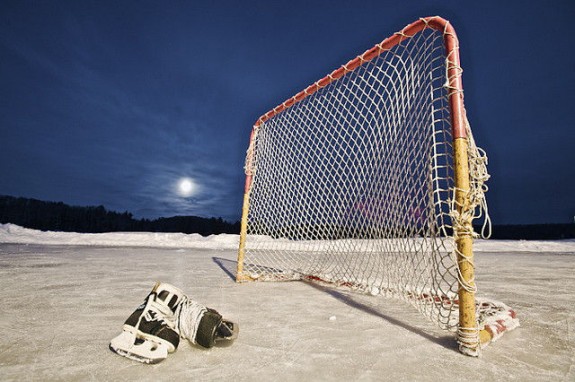Lately at DIY MFA, we’ve been talking about goal-setting. Now, I’m going to round out the week with a bit of goal-keeping.
Writing can sometimes feel a lot like goal-tending in a hockey game. Ken Dryden – former goalie for the Montreal Canadiens – said, “Because the demands on the goalies are mostly mental, for a goalie the biggest enemy is himself. Not a puck, not an opponent, not a quirk of size or style. The stress and anxiety he feels when he plays, the fear of failing, the fear of being embarrassed, the fear of being physically hurt, are all symptoms of his position, in constant ebb and flow, but never disappearing.”
Sound familiar? We stand there in our little nets, alone, unnoticed, until stuff gets thrown at us. All we want is uninterrupted writing time, but we have multiple responsibilities – juggling our jobs, our families, our friends and communities – while still keeping in mind our own goals.
Well, here’s what Dryden advises: “The successful goalie understands these neuroses, accepts them, and puts them under control. The unsuccessful goalie is distracted by them, his mind in knots. His body quickly follows.”
Setting a goal involves understanding and accepting our neuroses: our fears, challenges, opponents, hopes and limits. Keeping a goal involves putting these elements under control.
There’s a simple way to do this: set up a system. Or two. Or three. Here are some ideas that I’ve found useful.
1) Schedule
One of the best ways to complete a task is to break it into smaller tasks. Writing is a mammoth, never-ending task. It’s easy to say, “Write every day,” but to get the most out of that daily writing time, it helps to break it up. So, instead of viewing your life as a constant succession of writing days, view it in week-long chunks.
Every Sunday night, I sit down and make two check-lists. One is for my life – things I need to buy, people I need to call, sundry activities I need to accomplish and evening plans. Now, I can see what my week looks like, what nights I have free, what days are going to be super busy. From there, I can craft a realistic writing check list. I take into account my big goals and my small goals, and make a schedule. If I have Bible study on Monday night, I might need to wake up early to get my writing done. If I have dinner plans in Brooklyn, I know I’ll have an hour on the subway – that’s a great time to edit. By looking at the entire week, you can see when the pucks will be flying at your face. You can make a plan to dodge them. And you can keep your goals.
2) Community
Jacques Plant said, “Goaltender is a normal job. Sure! How would you like it if at your job, every time you made the slightest mistake a little red light went on over your head and 18,000 people stood up and screamed at you?”
Peer pressure is real. Anyone who’s ever been to middle school knows it. So why not use it? It can help you to keep the goals you’ve set. It’s like the screaming crowd at a hockey game: people perform better when they are accountable to someone.
When I finished my latest draft, I sent my book to Beta Readers. It was important that I not work on it while they were reading it. But I had a brand new, spiral bound copy, and I knew I couldn’t resist. So, I gave my print-out to my roommate, and told her not to let me have it for a week. I would have broken down and worked on it otherwise; in fact, I nearly did. She simply looked at me and said, “Bess. No.”
Unless I wanted to pummel my roommate, I had to keep my goal.
This can work for daily writing, too. Tell a friend or a writing buddy what you’re going to accomplish for the day or the week. Then, promise them an email. They’ll be looking for it. You’ll be obliged to provide it. Or, if your friend is also a writer, swap goals! At the end of the day you’ll be looking for an email and he or she will be, too. You’ll both keep your goals – Writing With Focus – while Building Your Community.
This is also a great way to get involved in social media. Blog your goals. Tweet your progress. When I’m going through a reading list, I always make a goal to review the book on GoodReads. It keeps me accountable to finish, to think critically about what I’ve read, and to be involved with the vibrant online community of readers and writers. The people who are on book-related social media are the people that will be reading your book one day. It’s a great way to meet them where they are, and also to accomplish your own goals.
3) Rituals
Whether you’re a single, stay-at-home writer, a busy parent or a corporate superstar, your writing time is precious and limited. A great way to keep the goals you set is to make your writing time as effective as possible. My writing time is precious, but sometimes I spend it staring at my computer! No matter where, when or how you write, a few rituals can help get you quickly into the head-space you need to be in to get your head in the game.
I live in New York and work three jobs, so I’m dashing in my writing time on the subway, at cafes after work or during my lunch break. I could write on a park bench one day and in my bedroom the next. But I try to always bring my writing playlist with me. I have crafted one for each book, and have them available offline on Spotify so I can access them anytime, anywhere. It puts my head right where it needs to be. Less staring. More typing.
By developing these rituals, you are conditioning yourself to be in a certain frame of mind when you give yourself certain triggers. Do you need a cup of coffee to put you in that space? Or a specific pen? Perhaps you always play a game of Free Cell to clear your head before you knuckle down. Develop these rituals. Keep these rituals. Most of the greats did it, too. Hemingway, for example, always played a game of billiards before he wrote. Also, when you are published, it’s a fun thing to share with readers – a great way to build community while writing with focus.
Goal!
Writers, like goalies, might be a bit crazy. We’ve undertaken a difficult task, a never-ending task, and an often thankless task. “The pressure,” Tony Esposito said of goal-keeping, “Is unreal. Most of the goalkeepers, they feel the pressure. The only ones that don’t worry are the ones too dumb to know what’s happening to them.”
We’re here in our corners, working away, and no one notices us until the crucial moment . . . but the pressure is always on. The stakes are high. The goals are big. And the rewards are infinite. Goal keeping isn’t just about finishing a project. It’s about developing a writing lifestyle. When you do that the analogy must end. Because when you’re writing and keeping your goals, you can’t lose.
Photo credit: Fikret Onal / Foter / CC BY
 Bess Cozby writes epic stories in expansive worlds from her tiny apartment in New York City. By day, she’s an Editor at Tor Books, and Web Editor for DIY MFA. Her work is represented by Brooks Sherman of the Bent Agency. Tweet her at @besscozby, contact her at bess@diymfa.com, or visit her website at www.besscozby.com.
Bess Cozby writes epic stories in expansive worlds from her tiny apartment in New York City. By day, she’s an Editor at Tor Books, and Web Editor for DIY MFA. Her work is represented by Brooks Sherman of the Bent Agency. Tweet her at @besscozby, contact her at bess@diymfa.com, or visit her website at www.besscozby.com.







